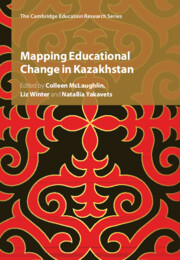Book contents
- Mapping Educational Change in Kazakhstan
- Mapping Educational Change in Kazakhstan
- Copyright page
- Dedication
- Contents
- Figures
- Tables
- Contributors
- Preface
- Acknowledgements
- Introduction
- Part I Foundations of Scaling Up
- Part II Piloting Initiatives and Scaling Up to the Whole System
- Part III Evidence of Implementation
- 12 The Aims and Methods of Evidence Collection
- 13 Regional Case Study 1
- 14 Regional Case Study 2
- 15 Regional Case Study 3
- 16 Beyond Piloting
- Conclusions
- Select Bibliography: School-Level Educational Reforms in Kazakhstan, 2011–2022
- Index
- References
13 - Regional Case Study 1
A Regional Study of Stakeholders’ Perspectives on Education Reform in Kazakhstan
from Part III - Evidence of Implementation
Published online by Cambridge University Press: 09 November 2023
- Mapping Educational Change in Kazakhstan
- Mapping Educational Change in Kazakhstan
- Copyright page
- Dedication
- Contents
- Figures
- Tables
- Contributors
- Preface
- Acknowledgements
- Introduction
- Part I Foundations of Scaling Up
- Part II Piloting Initiatives and Scaling Up to the Whole System
- Part III Evidence of Implementation
- 12 The Aims and Methods of Evidence Collection
- 13 Regional Case Study 1
- 14 Regional Case Study 2
- 15 Regional Case Study 3
- 16 Beyond Piloting
- Conclusions
- Select Bibliography: School-Level Educational Reforms in Kazakhstan, 2011–2022
- Index
- References
Summary
This chapter is a case study that describes the reality of innovation and reform of the content of school education in a single region in the south of Kazakhstan. The region has a mix of urban and rural schools, although the majority are rural in nature since agricultural employment dominates the local economy with some very remote locations and many families on low incomes. Despite the difficulties of geography, ethnic diversity and poverty, the research showed that the regional authority tended to adopt a ‘can-do’ attitude and looked for solutions to implement the Renewed Content of Education successfully rather than respond passively. There were pockets of resistance evident which prevented full implementation of the Renewed Content of Education. Such instances demonstrated the magnitude of transformation expected and the critical role of communication between regional authorities, district authorities, schools and parents.
- Type
- Chapter
- Information
- Mapping Educational Change in Kazakhstan , pp. 211 - 236Publisher: Cambridge University PressPrint publication year: 2023



